Can chickens eat flowers and which ones are to be avoided.
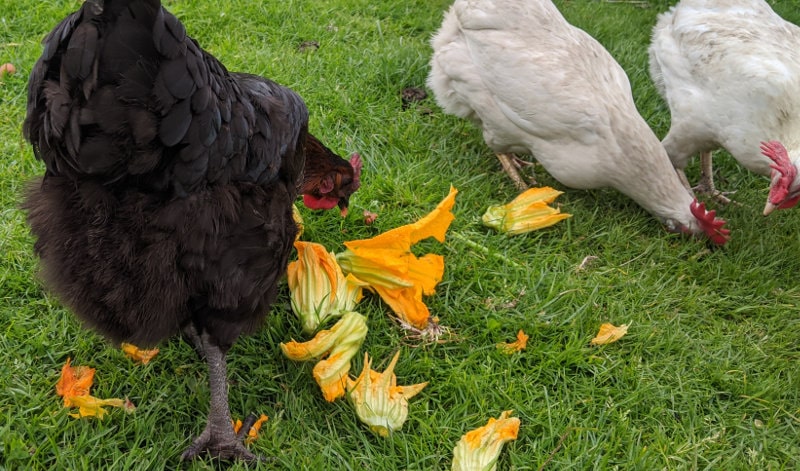
Free range chickens love to eat flowers and well as forage for greens. Planting edible flowers is one you can add diversity and essential nutrients to your chickens diet.
I have been growing dandelions for my chickens for years without really thinking about how good they were for them. For me the benefits were copious amounts of greens for my chickens early in the season as the dandelion is a hardy plants that sprouts and flowers early in spring.
Below: Dandelions are excellent for chickens, early greens and flowers as well as being hardy.
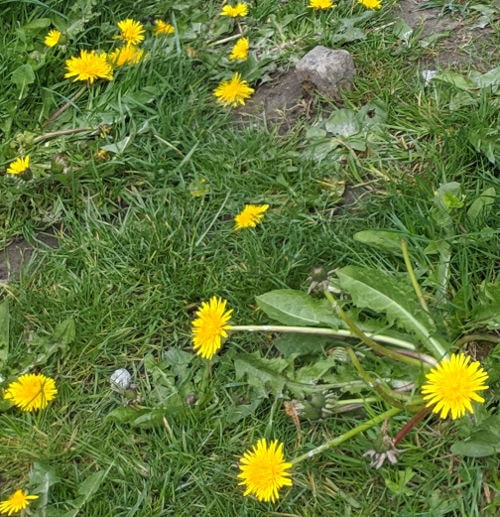
Ground flower petals, mostly marigolds, are often added to commercial chicken feed to help colour the yolks of the eggs you buy in shops.
I have since added a few others types of flower and started drying the petals so I can still feed some in winter by adding the chopped dried petals to their scratch.
I have a backyard garden and grow quite a few cabbages and broccoli varieties and now I always leave them to go to flower before I give them to my hens and I have been lucky that clover grows freely in my fields as this is a plant I have noticed the hens seem to like.
Can chickens eat flowers and which ones are good for them?
Chickens can and will eat flowers and there are quite a few that are both good for them and are easy to grow and unless there is a possibility that the flowers and plants have been sprayed with pesticides, fungicides or other chemical treatments you can feed anything off the list below to your flock.
Chickens can eat some flowers and some are better than other for the befits they bring.
Are flowers good for chickens?
There is a nutritional benefit to the consumption of flower petals and while detailed nutritional analyses of edible flowers is limited in numbers, several nutrients are common in the petals of flowers including vitamins A and C, riboflavin and niacin and minerals such as calcium, phosphorous, iron and potassium.
Below: The yellow colour in zucchini flowers helps with the yolk and eyesight.
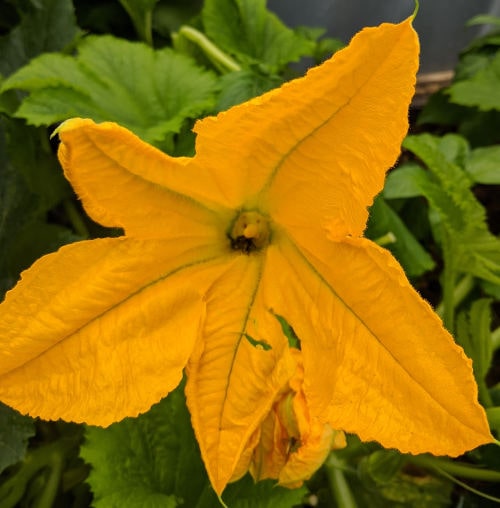
The colour compounds themselves may have benefits, Lutein and zeaxanthin are two types of carotenoids found in flowers, which are yellow to red pigments found widely in vegetables and other plants are known to be good for the eyes. These compounds not only benefit the chickens but are passed into the yolks of their eggs.
They also provide variety to the diet which is essential for chickens.
How to feed flowers to chickens:
Just like with all aspects of chicken keeping there are some practical considerations to keep in mind before giving your chickens flowers to eat.
Keep the following in mind when picking or foraging for flowers for your chickens:
Know what the plant is, accurate identification of flowers is essential so if you are not sure then do not use it.
Flowers should be served fresh, in small quantities and on a regular basis for the most benefit.
Pick young flowers on dry mornings to maximise the benefits.
As a rule give chickens the petals and discard stems, stamens, pistils and calyx. The exception to this is brassica, fennel and carrots where you have hundreds of small flowers and the whole plant is edible.
Do flowers need cooking?
No. Flowers should be served fresh and raw and regularly in small amounts.
What flowers can chickens eat?
There are many flowers that can be safely fed to chickens:
Cruciferous vegetable flowers - Chickens can have the flowers, and indeed the whole plant, from any member of the brassica family, which includes kale, Kohl-rabi, cabbage, broccoli, cauliflower, romenesco, Brussels sprouts and calabrese. So if, like me, you grow any of these varieties you can let them flower before pulling them up and feeding them to your flock, flowers and all.
Dandelion flowers - I have grown a patch of dandelions for years to give my chickens early greens in spring. Turns out I was doing the a favour without even realising it. The yellow colour is good for the yolks.
Pumpkin, zucchini and courgette flowers - These bright yellow and quite large flowers are often eaten by people so there's no reason why your hens should not get a few as well.
My first introduction to eating these was deep fried in tempura batter and with the quantity I get on my pumpkin plants the chickens never go without. Avoid feeding wild versions of the plants or the green stems and leaves as these contain a toxin called Cucurbitacin. Feed only the male flowers as the females need to be pollinated to fruit in most cases.
Bee balm - The leaves and flowers are edible both raw and cooked.
Root vegetables and radish - With the exception of the parsnip which has poisonous tops, many flowers of root vegetable that you grow in your garden can be fed safely to hens. Swede or rutabaga, turnip, beetroot, carrot and radish flowers are all edible for chickens. Again avoid the wild versions of these plants and use on cultivated species. You could even re-sprout your carrot tops for greens and flowers for chickens.
Below: I have a few radishes that have gone to flower and I feed these to the hens.
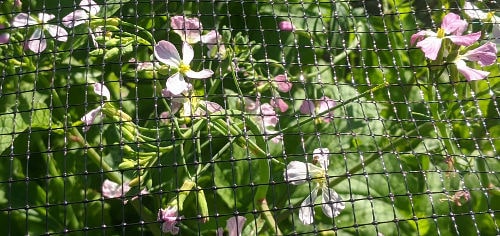
These are root vegetable flowers and not tubers like the potato plant, Never feed potato flowers or any green parts to chickens.
Rose and rose hip have long been used as natural remedies and the hip contains much vitamin C.
Lettuce - Bolting and flowering lettuce is way too bitter for most humans but chickens are not bothered and will eat it anyway.
Clover - Both red and white clover flowers are fine for chickens as the plant is edible from top to bottom.
Onion, chive and garlic flowers - There are some questions about whether the sulphur compounds in the onion family of plants will harm chickens or flavour the eggs. This has never been my experience and my chickens once got into my veg patch and all the green tops of the onion plants with no ill effects at all.
Marigold - Grow the standard French Marigold, remove the green parts and dry the petals for winter use.
Echinacea or coneflower - Flowers and seeds are supposed to be good for improving respiratory health and are taken by many humans. As chickens are susceptible to respiratory illnesses, echinacea may help.
Nasturtium - Brightly coloured flowers that will help the yolk colour no end.
Thistle - My chickens prefer to wait for the seeds but I have seen them eating the bright purple flowers in late summer.
Sunflowers - The petal of the sunflower are edible. Remove all traces of green or allow the seed head to ripen and feed the seeds to the hens as well.
Geranium - The flowers of geraniums are edible but too much bright red may redden the yolks so be careful which colours you choose.
Pansy - Pick a few as and when needed.
Violets - Have been used in cooking since Roman times and are fine for chickens.
Herb flowers like Borage (Borago offincinalis), Basil (Ocimum basilicum), Fennel (Foeniculum vulgare), Rosemary (Salvia officinalis), Mint (Mentha spp), Dill (Anethum graveolens) are al;l edible and can be safely given to chickens.
Garden pea – Flowers taste just like peas. Avoid the sweet pea.
Primrose - Another early flowering bright yellow edible flower.
Also considered edible are: Forget-me-not, Apple blossom, Calendula, Carnations, Chrysanthemums, Citrus blossoms, Eldberberry blossoms, Hibiscus, Lavender, Peony, Phlox and Snap dragon.
There may be a great many more types that chickens could eat if they wanted to. If you are unsure then the culprit is best not cultivated anywhere near where your chickens are to be kept.
Can chickens have old bouquets of flowers?
No. Definitely not. Tulips and lilies are toxic to many species and definitely not food. I had a friend who lost a cat recently after it ingested Lilly pollen cleaning itself.
When the flowers first arrive at the florists, they cut them and place them in a preservative to help them open up and keep them looking fresh. Florists also use antibacterial agents in the water to prohibit bacteria growth and all these chemicals get absorbed by the flowers and could hurt the chickens.
The leaves are cleaned with a foliage cleaning agent, since flowers sometimes come in dirty.
What flowers are poisonous to chickens?
If you are unsure then don't feed it to the chickens, better safe than sorry.
Below: Buttercups and kingcups should be removed from pasture.
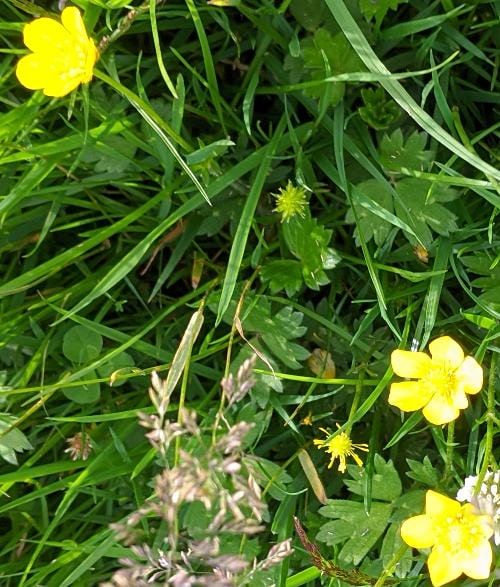
This is a longer list than the edible ones and if in doubt then avoid planting the following toxic plants in areas your chickens can get too.
This is a list of flowers that chickens can't have:
- Daffodil,
- Poppy,
- Clematis,
- Bluebell,
- Larkspur,
- Hydrangea
- Nightshade, black nightshade or any member of the family including aubergine, pepper , chilli and tomato.
- Potato.
- Castor bean,
- Privet,
- St. John's Wort,
- Sweet pea,
- Trumpet vine or creeper,
- Buttercup and kingcup, Not necessarily deadly but not nice to ingest,
- Oleander,
- Azalea,
- Corn Cockle,
- Foxglove,
- Henbane,
- Iris, the pollen is a killer,
- Lily of the Valley,
- Rhododendron,
- Convolvulus or bindweed,
- Rosebay willowherb.
My experience is that chickens tend avoid those plants flowers that are harmful to them, but that is not always the case.
Below: Foxglove contains digitalis which will kill chickens easily.
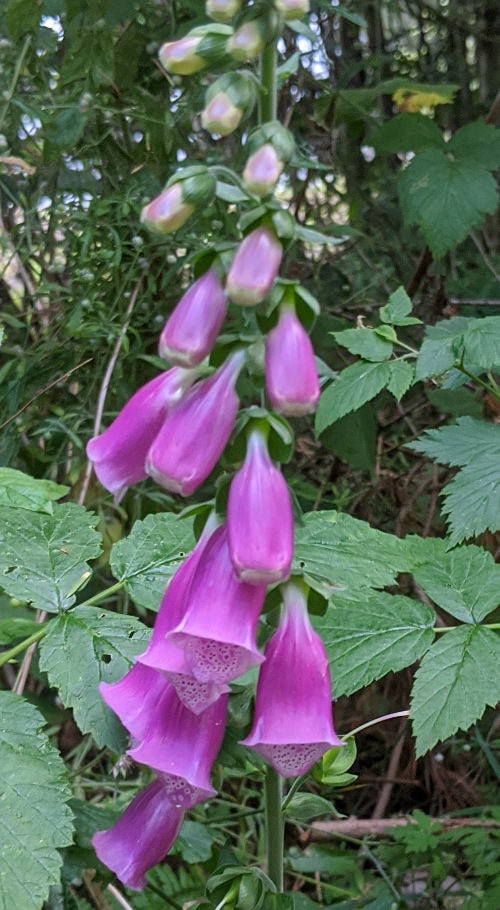
For a list of other plants known to be toxic to chickens.
How do you keep chickens and flowers separate?
Keeping your flock and your garden separate can be a real problem. There is much to draw them in, including you and the family and all those lovely flower beds filled with soft earth that is just right for scratching through and having a dust bath in.
If you want chickens and a flower garden then you have only 1 choice and that is to install a fence to keep them out. The only thing I've found that definitely keeps chickens out is a 6 foot fence.
A few methods that do not work for keeping hens out of flowers are:
- Sprinkling cayenne or chilli powder - Chickens don't have the taste buds and capsaicin receptors that humans do.
- Rubber snakes in the flowers to scare the chickens - It has to move like a predator to scare chickens.
- Cut brush, canes and twigs as a manual deterrent - supposedly chickens dislike being poked with sharp sticks and twigs and will leave the flowers alone. Let me know if this works for you as it has never worked for me!
- Foul smelling deterrents like vinegar - Well I thought you wanted to enjoy your flower garden, who are you trying to keep away.
